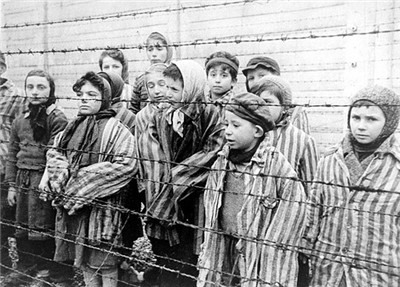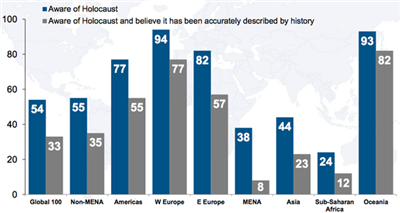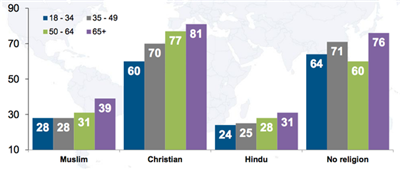(单词翻译:单击)
A new survey suggests that many Asians, Africans, Middle Easterners, young people, Muslims, and Hindus believe that facts about the genocide have been distorted.
一份新的调查显示有许多的亚洲人,非洲人,中东人,年轻人,穆斯林,印度徒相信有关大屠杀的事实真相是被歪曲的?
Child survivors photographed at Auschwitz in 1945. (Wikimedia)
来自WIKI关于1945年奥斯维辛集中营中的儿童生还者的照片
Only 54 percent of the world's population has heard of the Holocaust.
只有百分之54的世界人口是相信大屠杀的存在。
This is the most staggering statistic in a new survey by the Anti-Defamation League (ADL) of more than 53,000 people in over 100 countries, conducted by First International Resources. But that figure speaks to only those who have heard of it: Only a third of the world's population believe the genocide has been accurately described in historical accounts. Some said they thought the number of people who died has been exaggerated; others said they believe it's a myth. Thirty percent of respondents said it's probably true that "Jews still talk too much about what happened to them in the Holocaust."
百分之54的人口,这份最新的令人震惊的调查数据是来自ADL组织在100个国家关于53000名受访者所做的调查。由第一国际资源组织进行统计分析,但这份调查只针对听过大屠杀传闻的人。只有三分一的世界人口相信大屠杀是真实存在于历史资料中。有人说大屠杀中死亡的人口可能遭到了夸大,百分之三十的受访者表示犹太人目前还在过多的谈论他们有关大屠杀磨难的历史,所以大屠杀是有可能存在的。
Seventy years after the liberation of Auschwitz, two-thirds of the world's population don't know the Holocaust happened—or they deny it.
奥辛维斯集中营的磨难已经过去了70年了,三分之二的世界人口并不知道大屠杀是存在的,或者持否认的态度。
These beliefs follow some unexpected patterns, too. The Middle East and North Africa had the largest percentage of doubters, with only 8 percent of respondents reporting that they had heard of the genocide and believed descriptions of it were accurate. But only 12 percent of respondents in sub-Saharan Africa said the same, and only 23 percent in Asia. People in these groups were likely to say they believed the number of deaths has been exaggerated—just over half of Middle Easterners and a third of Asians and Africans think the body count has been distorted over time.
这种模式信仰理念是令人不可思议的。中东和北非地区的有关质疑者是最多的,只有百分8的受访者报告显示,他们相信史料所描述中大屠杀是真实存在的。萨特阿拉伯以南的受访者只有百分之12有相同的观点。在亚洲只有百分之23。在另一部分的受访人群中,他们认为大屠杀的死亡人数是被夸大的。只有一半的中东人和三分一的亚洲人,非洲人相信死亡人数的统计在过去是被歪曲事实的。
-Percent Who Have Heard of the Holocaust
关于已经听说过大屠杀的人口比例
When the data is sliced by religious groups, the results are even more surprising: Hindus were most likely to believe that the number of Holocaust deaths has been exaggerated. Muslims followed closely, and those two groups were distantly trailed by Christians, Buddhists, and those with no religion. In no coincidence, Hindus and Muslims were also significantly less likely to have heard of the Holocaust.
当参考数据被细分到宗教群体的时候,那么结果更是大大的超出意外,印度教和穆斯林是最愿意相信死亡人数是被夸大的。印度教是最多比例穆斯林次之。而基督教,佛教徒和无神论者的比例被他们远远甩开。无独有偶及显而易见的印度教和穆斯林不乐于谈及大屠杀。
In almost every religious group, people younger than 65 were much more likely to say they believe that facts about the Holocaust have been distorted, and they were less likely to know what the Holocaust is.
在大部分的宗教人群中,65岁以下的人是最愿认为大屠杀的历史是歪曲的,他们也对所谓的大屠杀没有了解的兴趣。

Percent of Who Believe Facts About the Holocaust Have Been Distorted, by Age and Religious Group
关于已经听说过大屠杀的宗教人口比例。
The report by the ADL, a Jewish NGO that campaigns against anti-Semitism and discrimination, also covers the prevalence of other anti-Semitic attitudes, including beliefs about Jews' allegiance to Israel, influence in media and business, and likeability. Although the prevalence of Holocaust ignorance and denial was just one small aspect of the survey, it illuminates a powerful fact: As the memory of the genocide grows fainter, attitudes toward Jews—and Israel—are changing. The fate of the Jewish people in the twentieth century was largely centered around the Holocaust: the anti-Semitism that facilitated it, the loss it wrought, and the reflection it prompted. As that history becomes more distant, it's unclear what will animate the Jewish community—and attitudes toward it—moving forward.
这份报告来自ADL,一个犹太的民间活动组织反击了关于此报告的反犹歧视,和普遍存在的有关犹太人忠诚信仰以色列的论调。影响了犹太人在媒体和贸易的对外好感度。虽然这种普遍对大屠杀的无知否认只是对一小方面的调查。但却揭露了令人震惊的事实。随着大屠杀的记忆逐渐被遗忘,人们对以色列和犹太人的态度开始转变。20世纪的犹太人命运是和大屠杀紧紧相连的。反犹太主义在当时盛行并造成了犹太人大量灭绝,伴随这段历史带来的反思。随着时间渐行渐远,善不清楚什么样的原因和外界态度促使了犹太人团体的进一步举动。
Depressingly, the study does hint at the way most people get their information about Jews and the Holocaust today:
这张图揭示了如今人们了解犹太大屠杀有关信息的最寻常的途径。



